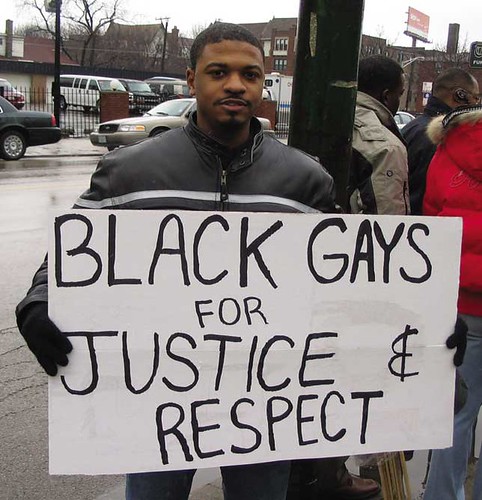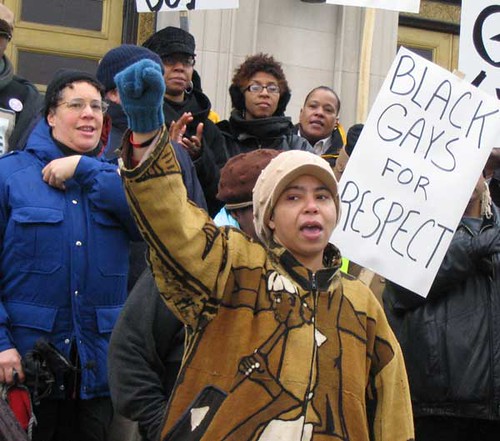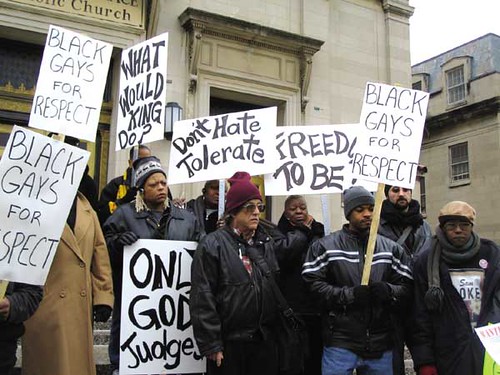Black LGBTs March for Justice on MLK Day
Source: Windy City Times
by Andrew Davis
2007-01-17
On Martin Luther King, Jr., Day—when millions of Americans remembered an icon who fought for equality—approximately 50 marchers walked across a stretch of Chicago’s South Side to speak out for justice on behalf of the Black LGBT community.

Participants gathered at the Carter Temple Christian Methodist Episcopal Church at 7841 S. Wabash ( just east of State ) and marched to Our Lady of Peace Catholic Church on 79th and Jeffrey ( 2000 East ) —a distance well over two miles.
The march was spurred by the Dec. 31 shootings that occurred at a party on the 7900 block of South Woodlawn; during that spree, six attendees were shot.
All have recovered; the shootings are still unsolved.
Contrasting with the violence that marred that party on New Year’s Eve, Monday’s march was peaceful—again, in keeping with King ( and his position of non-violence ) . With chants of “Don’t hate—tolerate!” and “What do we want? Peace and Justice! When do we want it? Now!,” the marchers, who braved cold and snow, elicited a spectrum of reactions from strangers, ranging f rom one woman who said “You wish,” to drivers who honked their horns in support.
A primary reason that the march was incident-free involved the presence of police. Several officers in cars convened at the starting point and provided a constant presence throughout the entire march, blocking off streets to let the activists cross.
Lt. Regina Evans of the Fourth District told the crowd before the march: “We know that people are ignorant and that’s one of the reasons you’re out here today. Hopefully, people will get your point. What you’re marching for is important. Everybody deserves to live in peace. We support you.”
During the march, Evans ( who marched the entire route, and on her “off” day ) told Windy City Times that the police presence was necessary to show that officers took the march—and the cause—seriously. “There are some characters in this area, so I want to make sure no one tries something,” she said. “We’re taking a no-nonsense approach. I told [ Marc ] Loveless that even after the march, you can’t just leave them alone.” Evans also said that the because of the unknown “threat level,” she wanted to be safe rather than sorry; the security issues for this march were somewhat different than a march that targets gang violence, for example.
She added that “any crime [ like the shootings ] is just heinous, period. We need to investigate why it happened, catch the offenders and find out the motive. If [ the motive ] involves hate towards a particular group, that needs to be addressed.” Evans also said that some of the comments from locals who were interviewed by the media were “disturbing. No one has a right to dictate where people can live because of someone’s race, gender or sexual orientation [ a reference to people who called the area ‘a normal neighborhood’ and who said ‘gays should move to the suburbs’ ] . We’re promoting peace and we’re not going to allow anyone to be attacked. We want to be proactive; we don’t want to come onto the scene after someone’s been abused.”

Concerned citizen Marc Loveless ( the primary organizer of the event ) told Windy City Times that “we, as Black gays and lesbians, have to stand up in our communities. We demand some respect. We think that all of that stuff that happened was based on a rush of judgment. There are Black people who don’t believe that there are gay people in their neighborhoods, so we need to make a statement and [ march ] . Also, we’re acknowledging the other elements of the Black gay community, such as the ball and women’s communities. That’s what’s great about this—I think the real story is the racial and [ age-related ] diversity we have here. Someone’s got to take notice of that and, hopefully, the people who [ committed the shootings ] will be caught and we can find out what’s going on.”
Tommy Avant Garde of Project VIDA told Windy City Times that he took part because the march was “for justice for the kids on 79th and Woodlawn who were attacked by the gunmen who came into the house. A lot of time the kids can’t and won’t speak for themselves because they’re not out. It only takes one to be a catalyst for movement and to show that there is someone out there who will speak for them.”
For a few minutes, the marchers stopped at 79th and Woodlawn—steps away from the house where the shootings occurred. At that point, a couple of the marchers talked with two residents of the house—who joined in the march.
At the end of the march, Ira ( one of said residents ) thanked the crowd. “I want to thank all of you for your support,” he said. “ [ The shootings were ] really tragic. I thank God that everybody’s safe and OK. I don’t know how far it’s going to go or if anything’s going to change, but I just thank you for the start. I didn’t know that so many people cared.”
Loveless told the marchers that the event was for “an issue that impacts all of us.” The response of women across the street, who yelled and clapped their hands in support, then led him to say that “you can see ... that hate is not the norm. Whatever those young men were thinking, they weren’t thinking for [ most of people ] in this community.”
Evans thanked the marchers for being peaceful and lauded them for being effective. “Sometimes it’s not in the numbers but in the power of the message,” she said. “I think you demonstrated that.” Evans also implored the marchers to let police know if they feel threatened, and asked them to attend police beat meetings. ( She advised people to call 311 if they don’t know their beat. ) “I don’t encourage to have separate meetings,” she added. “You’re part of the community; you’re not separate from the community.”
Politicians were scarce at the march. Among those present who provided some sort of political link were a representative from mayoral candidate Dorothy Brown’s staff; Bill Greaves, Mayor Richard Daley’s LGBT liaison; and Janice Jeffries, an aldermanic candidate for the 15th ward. Among the organizations represented at the march were the Black LGBT Allies for Equality; The Gay Liberation Network ( GLN ) ; and Chicago Black Gays and Lesbians.
A few people also circulated a flyer about the shootings. Included were a summary of the incident, descriptions of the offenders and an offer of a cash reward of up to $1,000. Anyone with information should call 800-535-STOP or dial 311.

Press conference
On Jan. 12 at City Hall, Loveless called a press conference to announce the march. “This is a true coalition of groups across the city,” he said. “This is a city of diversity ... and this is a call for justice. We came together to respond to some of the comments that were made regarding the shootings as well as the ‘rush to judgment’ statements made by the city disqualifying or marginalizing the impact of this incident.”
Will Lockett of Black LGBT Allies for Equality said that the march “represent [ ed ] a chance for gay people to stand up to [ anti-gay ] sentiment. ... Violence is not acceptable. We want to implement long-term goals for gay and lesbian people to be welcome in any community where they are.” He also said that “we will not tolerate silence anymore from Black leaders. Everyone must step up against hatred.”
Avant Garde, a co-founder of Chicago’s modern ball culture ( a subculture of LGBT youth ) , addressed a statement that the shootings were precipitated by different ball culture houses ( families ) at the party. “That’s not true,” he said. “I spoke with youth that morning who [ ran ] from the house. This was an incident that, in my opinion, was a hate crime. Anytime there are people in a space who are not bothering anyone and someone comes in with a gun and shoots, it’s a hate crime. ... For this to happen in a city that just hosted the Gay Games is just a tragedy.” Avant Garde also provided some insight into the local ball scene, stating that it’s primarily for African-American youths aged 13-24 who “release their gifts and talents in the ballroom” in competitions.
Bob Schwartz of the GLN also spoke. “We’re here to show solidarity with our Black brothers and sisters,” he said. He also talked about the hate-crime theory, and even called out a certain North Side alderman: “We recognize that the jury is still out regarding exactly why the shooting took place, but it’s troubling to [ the organization ] that officials from the city of Chicago, the police department and Tom Tunney ... have leaned over backwards to suggest that it wasn’t a hate crime ... . Daley and Tunney may want to present the city as being free of hate crimes, but we know better, and the level of anti-gay hostility expressed by some should have condemned by Tunney; African-American and white leaders; and Daley—but very few have had anything to say about it, and that’s extremely troubling. They would’ve been right out there ( as they should ) , if there had been a racist attack on African Americans.”
 POSTED: 8:05 am PST January 25, 2007
POSTED: 8:05 am PST January 25, 2007 


